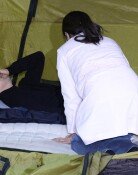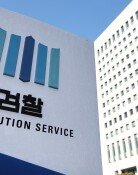City Puts Emphasis on Adult Education
City Puts Emphasis on Adult Education
Posted March. 16, 2006 03:13,
As night falls on the seaside village of Whapo in Byeollyang-myeon, Suncheon City, Jeonnam Province, old ladies walk into the town hall for Hangeul (Korean alphabet) classes. They are carrying notebooks, Hangeul textbooks, and pencil cases.
Hanging on the wall of a classroom barely 20 pyeong wide is a large poster with the Korean alphabet written on it.
Before starting class, Yoon Hae-kyeong (45), the teacher, tells her students to spell the words they learned from the previous class. One elderly student scratches her head; shes forgotten how to spell something. When Yoon shows her how, she smiles shyly.
The illiteracy rate in Suncheon city is 7.7 percent. The city has opened 139 schools since 2004 in order to cut that percentage to zero by the year 2010.
In an English class at a citizens center in Jogok-dong, about 10 housewives in their twenties and thirties are sitting around their teacher, Mary Brankin (26), and are talking to each other in English.
As Brankin asks the question Whats your favorite color? the students answer in English one by one.
Yoo Kyeong-wha (housewife, age 27) said, I take one hour of English speaking classes two times per week, and because I dont have to pay any class fees, I can take this class without worrying about a financial burden. When the beginners class is over, I am going to take the intermediate class in June.
There are 11 native English speakers teaching at 24 citizens centers across the city. They visit these centers and teach English. About 2,700 people enrolled in these classes last year.
There are a total of 60 elementary, middle, and high schools in Suncheon City, and 85,000 students at these schools, excluding the students from the four vocational schools, are taught by native speakers in their English classes. This means 35 percent of the 270,000 citizens are taking English classes for free.
Historical Town 302 in Nakan-myeon, about 20 kilometers away from downtown Suncheon, is preserved as it was in the Joseon Dynasty, with a government office and about 100 straw-thatched houses inside a walled town.
As soon as you enter the town, a straw-thatched library can be seen as well. Suncheon City spent 40 million won May last year to transform one of the straw-thatched houses into a library.
There are approximately 2,200 books in the library divided into childrens, adolescents and adults. A variety of books, including fairy tales, fiction, up-to-date magazines and well-being related books are displayed on the shelves.
Volunteer worker Bong Mi-yeon (40) said, The library is not just used as a place to read books. People can just come and rest and mingle with each other and children can learn ceramic art or pansori [traditional Korean narrative songs] here. She added, Tourists are impressed by our library. Its our towns treasure.
Suncheon has opened a total of 12 new small libraries in 2004 by remodeling town halls or the management offices of apartments. Seven opened last year, and five more are expected to open this year.
Suncheon is called Library Heaven because there is one library for every 10,000 citizens. This all started in 2003 when MBC and the Peoples movement to make book reading part of society jointly worked to promote a crash library expansion program.
By operating programs which both adults and children can enjoy together, such as spending a night at the library, puppet shows, and poetry reading, 13,000 people from 300 organizations nationwide visited our libraries, director of Suncheon library Heo Sun-yeong said.
Suncheon City was the first domestic local autonomous entity to join the International Association of Educational Cities (IAEC) last December. This came as a result of implementing custom-made life-long education programs for citizens since 2003, and for spending more than one percent of its total budget of 420 billion won on these programs every year.
Yang Dong-ui, the director of Suncheon Citys lifetime education programs, said, We will try to make our city into a world-class lifetime education city by providing an educational environment where anyone can learn anything he or she wants to regardless of age.
Seung-Ho Jung shjung@donga.com



![“한동훈, 정치생명 걸고 무소속 출마해 평가받는 것 고려할만”[정치를 부탁해]](https://dimg.donga.com/c/138/175/90/1/wps/NEWS/IMAGE/2026/01/19/133186982.1.jpg)



